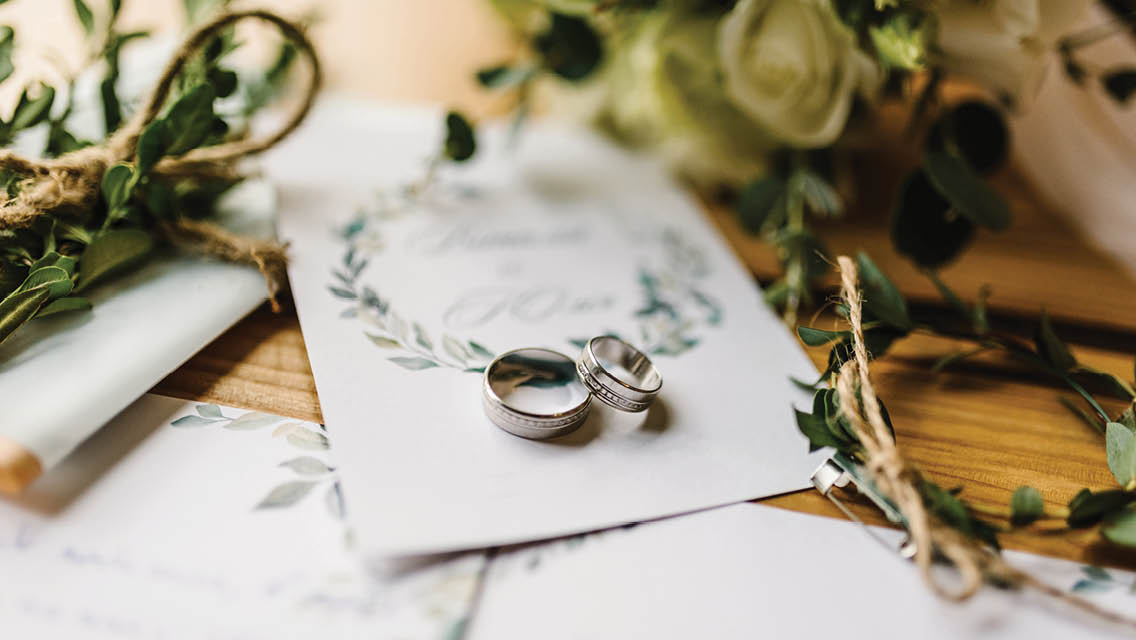Over the past year and a half, I’ve realized a generally acknowledged, yet often unheeded, truth: Planning a wedding is chaos. OK, maybe it isn’t if you’re an actual wedding planner or a master organizer — but for most mere mortals, wedding planning can feel like purgatory.
There’s so much to do and seemingly so little time in which to accomplish it, not to mention that the process is laden with triggers related to body image and dieting, perfectionism, and family dynamics. As an anxious person with a history of disordered eating and people-pleasing tendencies, I have found wedding planning to be the ultimate test of my resilience.
Now, don’t get me wrong. I’m immeasurably excited to marry my partner of 11-plus years — I’ve anticipated our wedding day since I met him at a local coffee shop when I was 17. All the planning stress will undoubtedly be worth it as soon as I see him at the altar; the challenge is getting there with my mental and physical well-being intact.
Because I’m sure I’m not alone in this struggle, I’ve decided to (responsibly) procrastinate wedding to-dos by compiling an “In and Out” list with expert advice on what’s helping me stay grounded, healthy, and true to myself amid the premarital mayhem.
Out: Crash Diets and Bridal Boot Camps for Weight Loss
A 2019 survey found that 62 percent of brides want to lose weight before they say “I do.” This is hardly a surprise given how much wedding preparation is devoted to the bridal look — as well as the lack of body diversity in bridal ads.
“The diet industry is a
multimillion-dollar machine that profits
off of our self-consciousness
and feelings of never being good enough,
thin enough, pretty enough, muscular enough, et cetera.”
This pressure can be particularly troublesome for people who, like me, have a history of disordered eating. Seeking to change my body through dieting measures — particularly extreme ones — can become a slippery slope back into dysfunctional and unhealthy behavior patterns.
In: Holistic Health
As I make my way toward the altar, potentially relapsing is at the top of my mind. To help mitigate my risk, I’m prioritizing lifestyle practices that center my whole-body health and wellness rather than my appearance. These include engaging in intentional cardio and resistance training; eating regular meals and snacks; focusing on whole, minimally processed foods; not denying myself sweets; and adjusting my social media settings to avoid diet-related content.
“‘Sweating for the wedding’ has become really normalized,
but we should all remember that
clothes are meant to fit our bodies,
not the other way around.”
I’m also practicing body neutrality and body acceptance — both of which, says Nisbet-Croes, can help those who’ve struggled with body image, eating disorders, or disordered eating. This can be as simple as choosing a wedding dress that flatters the body I have (a short, athletic build), rather than a smaller version of my body or those of the models I see on my Pinterest feed.
“‘Sweating for the wedding’ has become really normalized, but we should all remember that clothes are meant to fit our bodies, not the other way around,” says Nisbet-Croes. “Your body is your home, and it carries you through this life.”
Out: Self-Neglect
An overwhelming task like planning a wedding can easily become all-consuming. Obsessing over the process may lead dedicated or anxious planners to overlook foundational pillars like sleep, exercise, hobbies, and relationships.
Stressful periods involve an increased demand for resources such as time, money, and energy, says couples therapist Landis Bejar, LMHC, LPC, founder of AisleTalk, a wedding stress, marriage, and relationship counseling practice. “Most forms of self-care require at least one of these resources, too. Often, that increased demand means we have to reprioritize what gets our resources, and taking care of ourselves gets pushed to the bottom.”
In: Boundaries
In one of life’s great ironies, the practices we tend to abandon when overwhelmed are most valuable during stressful times. “Keeping up with your self-care practices is what is going to help sustain you,” Bejar notes. “We won’t be able to give and contribute joyfully to our wedding or the people involved in it if we don’t first take care of ourselves. Eventually, we will get burnt-out, resentful, or paralyzed.”
My own self-care starts with boundaries. While my natural anxiety-driven inclination is to self-isolate and work frenetically to get everything done as quickly as possible, I’m taking a bite-sized approach to wedding planning. My fiancé, Tomy, and I set limits: We try to work through one task at a time, every week or so.
Keeping things focused creates space to fulfill my physical needs (making healthy meals, exercising regularly, resting) as well as my emotional needs (seeing friends, reading, spending quality time with Tomy). I also keep planning separate from these activities — part of self-care is staying present in whatever I’m doing.
Out: Negativity Spiral
Humans are hardwired to look for the negative in our environment; it’s an evolutionary advantage that helped our ancestors avoid threats and harm. Yet a negativity bias can become a self-reinforcing cycle.
“When we’re stressed — and who isn’t when planning a wedding? — that negative tilt gets exaggerated many times over,” says integrative psychiatrist Henry Emmons, MD, author of The Chemistry of Calm. “That means being more vigilant, looking for danger, narrowing our view to see what’s wrong or what might go wrong. Unchecked, it can take over our conscious mind.”
There are so many wedding choices to make and elements to fit together that something is bound to wind up sideways. Fixating on the gaps (whether real or imagined) in our vision for the wedding can be paralyzing, preventing us from moving forward and eventually enjoying the outcome of our hard work.
In: Permeability
It may be tempting to close ourselves off to avoid getting hurt when reality fails to live up to our expectations. We can’t be disappointed if we don’t really try or care, right? But there are other ways to counter this tendency to spiral, like cultivating a mindset of permeability.
Emmons describes permeability as absorbing both the good and the bad we encounter, letting life’s rewards and penalties move through us without holding on too tightly, and playing our own role in giving and receiving.
I love the idea of embracing permeability while wedding planning, because it applies to many issues that arise. “For example,” Emmons notes, “if the flowers you had your heart set on aren’t available, or something goes wrong at the last minute, fine. You let yourself feel a pang of disappointment and then you let it go. You have stress, but you don’t have a buildup of stress.”
A permeable mindset enables you to pivot to whatever is available and enjoy the goodness of that option, too, he adds. “It allows you to see the humor and even get some pleasure from the inevitable glitches that make the whole process more interesting.”
Permeability also helps reinforce body acceptance. Many of us have imagined what we would look like on our wedding day, but the reality may be quite different. Permeability allows us to acknowledge that disconnect — as well as the feelings it evokes — without judgment. “Honoring that you don’t have to feel 100 percent amazing about yourself at all times in order to care for yourself and cheer yourself on is really important,” says Nisbet-Croes.
Out: People-Pleasing
When it comes to weddings, everyone has an opinion. The guest list, venue, schedule, flowers, food, you name it — every choice can be subject to critique. Facing this onslaught of advice and external expectation can intensify some people’s overly complaisant tendencies.
This is partly a reaction to the worn-out Bridezilla trope, characterized as being burdensome, uptight, and overly opinionated — qualities that people-pleasers go out of their way to avoid, Bejar explains. “The people-pleasing bride might double down on her baseline people-pleaser tendencies in a desperate attempt to evade being perceived as a Bridezilla.”
As a textbook people-pleaser, I tend to be overly agreeable to avoid criticism, conflict, or rejection — especially when faced with other people’s strong opinions. I often let their perspectives supplant my own, which has occasionally led to frustration and resentment, two things I absolutely don’t want to take away from my wedding experience.
In: Honoring My Internal Compass
A beautiful lesson I’ve learned over the past few months is that I can listen to everyone without taking everything they say on board. It goes back to Emmons’s thoughts on permeability: I can let other people’s opinions flow through me without letting them dictate my decisions.
“Many people actually don’t care if you use their advice — they’re simply trying to be helpful or honestly just filling conversation,” Bejar says. She recommends developing a boilerplate response to use when people offer suggestions, such as “That’s a great idea; I’ll give it some thought” or “Thanks for the suggestions. I’ll check with my ______ (planner, mom, partner, etc.).”
A beautiful lesson I’ve learned
over the past few months is that
I can listen to everyone without
taking everything they say on board.
I am also using this experience as an opportunity to practice sitting with uncertainty and discomfort as I determine my own preferences. Although ubiquitous marketing efforts and my anxiety want me to believe that all my decisions need to be made right now, I don’t need to make a snap decision to ease my distress. It’s OK to sit with my options for a few days or weeks before making a final choice, allowing my true feelings and thoughts the chance to surface.
Out: Perfectionism
I’ve been a perfectionist all my life. And my old perfectionist monster, with its biting internal criticism and self-defeating diatribes, has become increasingly formidable as of late.
This voice is known as the inner critic, Bejar says. “It’s well-intentioned, somewhat, because its job is to keep you safe, protect you from harm, and ensure you’re OK. This includes emotional harm, ego-bruising, embarrassment, and so on,” she explains. “Your inner critic does this by launching every criticism it imagines anyone else could think of before you can make the mistake that would lead to such outside criticism or emotional pain.”
Bejar adds that it’s common for our negative self-talk to go into overdrive while planning a wedding. With so many tasks to complete and so many eyes on our decisions, invoking our inner critic is our attempt to protect ourselves from potential rejection and failure.
In: Good Enough
No amount of planning will ensure that my wedding goes off without a hitch. No matter what I do, there will be things that go wrong, as well as things I wish I’d done differently.
I could certainly spend the next few months stressing over all these things. But if I do, I forgo the “good enough” in pursuit of the perfect — an illusory goal that can never be achieved — and I rob myself of the opportunity to enjoy the process, as well as my last months as a Tynjala. And I don’t want to step into this new, exciting phase of my life beaten down and demoralized by a monster of my own making. It’s time to put that baby to rest.
Doing this requires removing the inner critic’s power. Let her know that you understand she is there to protect you but that you don’t need protection in this way, Bejar advises. You are safe and loved; you are good enough.
This self-compassion can help us relax into the understanding that nothing will ever be perfect — not in wedding planning, not in life — but as long as we show up and stay present, everything else can and will be good enough too.





This Post Has One Comment
What a raw and vulnerable article by Molly. She shared her personal challenges with a renewed attitude, expressing all the emotions, feelings and behaviors that so many of us encounter, whether we’re getting married or just attempting to accept ourselves. Planning a wedding can be so overwhelming, although, in the process, Molly learned the importance of applying healthy coping skills as well as recognizing what she needs to manage stress and anxiety. Thank you, Molly, for courageously sharing your personal struggles and how you’ve learned to keep the self judgement in check.